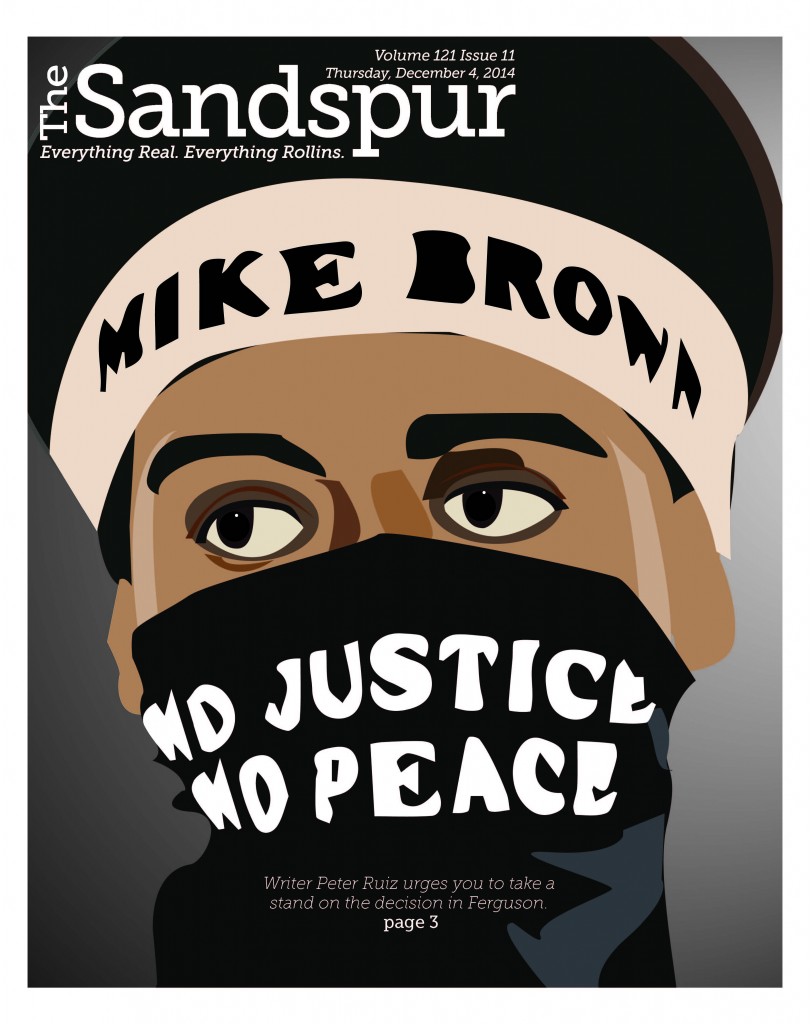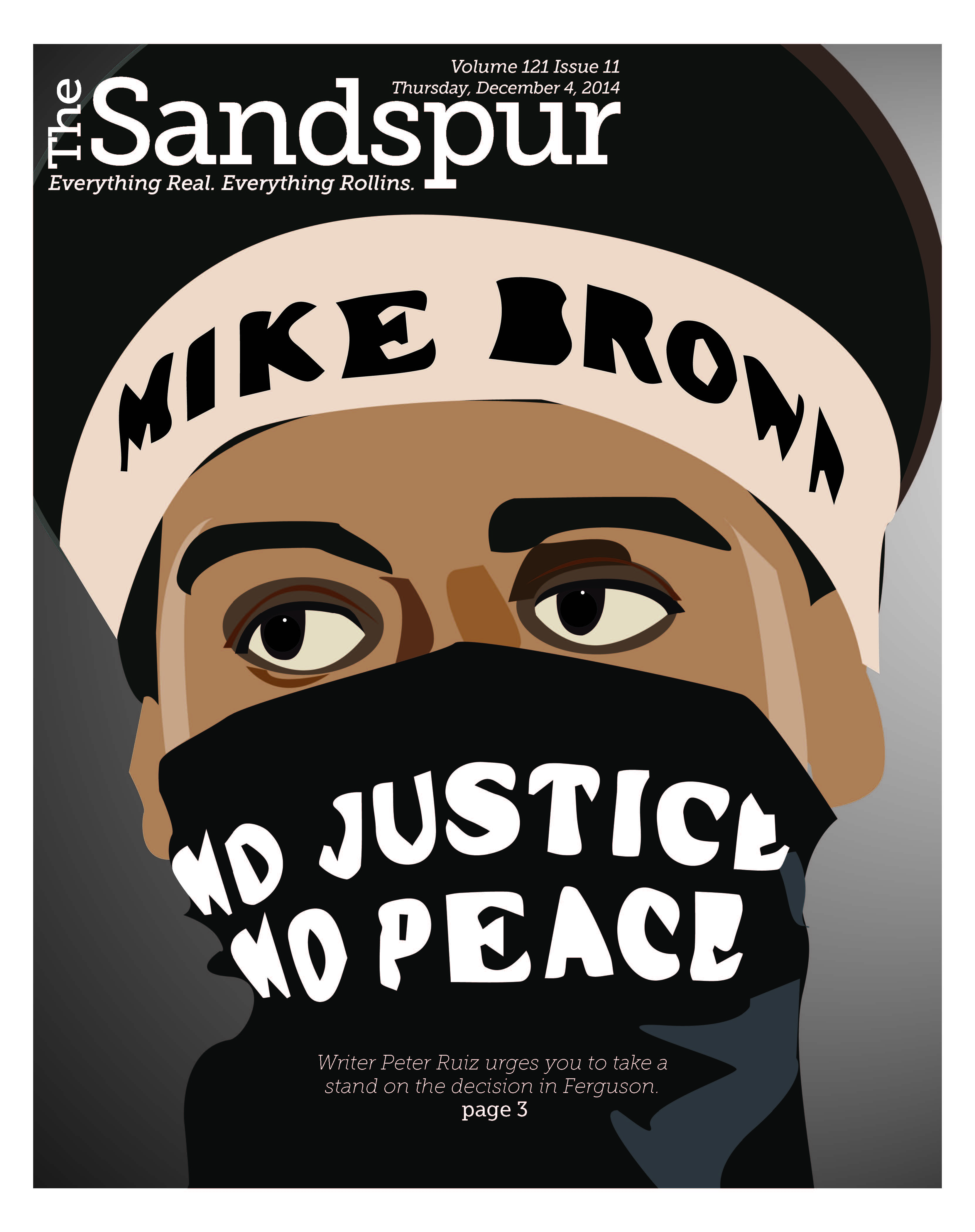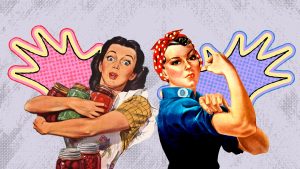![]()
 I am a young, male college student living in Winter Park, Florida: a very privileged area in the United States. On November 25, 2015 at 1:30 a.m., I decided to stage a sit-in at Rollins College for Ferguson, Missouri, and Michael Brown, a boy who lost his life too soon.
I am a young, male college student living in Winter Park, Florida: a very privileged area in the United States. On November 25, 2015 at 1:30 a.m., I decided to stage a sit-in at Rollins College for Ferguson, Missouri, and Michael Brown, a boy who lost his life too soon.
You might be wondering “how does the murder of a young black boy in Missouri affect my life?” The answer is: it does not, which is exactly why I must stand.
The events that transpired in Ferguson over the past months are the result of centuries of racism in our nation. The case of Michael Brown did not occur in isolation; it is the continuation of an old pattern. The population of Ferguson is 67% black, yet the police force is 93% white. Darren Wilson was an officer from another police force that was shut down due to malpractice and racial tensions. Racial profiling made Ferguson a powder keg ready to explode, and Brown was the casualty that made it detonate.
The protests and riots after Brown’s murder show that this was a community tired of being abused and mistreated by the very people who are supposed to protect and serve them. The media proceeded to vilify Brown, painting him as a thug and a pot-head. They perpetuated the story that Wilson stopped Brown in connection to a robbery even after the Police Chief explicitly stated that Wilson was unaware of the robbery.
The media continued to spread the story of the robbery after the store owner, the store clerk, and the store owner’s lawyer stated they did not believe it was Brown who robbed them. Then, there was a sham grand jury trial. The prosecutor of the case is the President of The BackStoppers Inc., an organization which fund-raised for Wilson. He hired a medical examiner with no credentials on behalf of the Brown family. Only one of the witnesses, witness 10, corroborates Wilson’s story. Their testimony has also changed substantially since their initial police interview.The grand jury was presented with a law that, if still in place, would have made Wilson’s action legal. But that law was ruled unconstitutional in 1985. The trial was not handled well, to say the least.
In the end, Brown did not receive justice. You are probably still asking yourself why I would feel the need to organize such a response. I believe that even though I am not black, even though I am not a citizen of Ferguson, and even though I am not a relative of Michael Brown, I must make a statement.
In fact, it is because of those very reasons that I must make a statement. The people of Ferguson, black folks, and the relatives of Brown are deemed too emotionally invested to have good judgment about the situation by society.
So I, as a seeming outsider, am deemed by society to be more worthy to speak on the subject, more sought out, more listened to. My morality and my conscious tell me I must stand with the people of Ferguson, with Brown’s family, with the black community, and lift their voices, because this is what loving other people looks like. You do not kick someone when they are down. You help them to stand on their own two feet.
This is what allyship looks like. Taking action. On the night of the verdict, I could not sleep. I knew that my friends were hurting and that there was nothing I could do to ease their pain. I knew that I had friends in Ferguson marching alongside the community, supporting them, being shot at with rubber bullets and tear gas. I knew that Brown’s family was probably sitting up awake as I was wondering why it was their boy who was killed. I realized what I could provide to the people in my life, who were currently struggling with this pain, a show of support.
So, at 1:30 a.m. on November 25, I began to message people to see who would join me in a show of Solidarity, Compassion, and Love with Ferguson. The response I received surprised me, and we showed up in numbers and stood in the campus center on a rainy day seeking to educate our wider campus community, but also to create a moment in which we could be together as a community.
It was necessary and powerful. We spoke to people who refused to listen, we sang, we held hands, we cried together. This was a moment of love that was necessary for all of us. This was necessary to recharge our spirits for the continuing fight against a system which does not see value in blackness and black people.
I stand for justice. I stand for love. I stand for my friends when they need strength. I stand for those same friends who give me strength. I stand for a future in which black people are not being systemically killed. I stand for a future in which black childhood is not vilified. I stand for the strong men and women who have been standing alone for far too long. I stand for the hope that if this were me, someone would stand. I stand because as a non-black person of color I have privileges that black folks in America do not. I stand because I love my country, but the system is corrupt. I stand for Michael Brown, Tamir Rice, Reika Boyd, Kendra Smith, Darren Hunt, Eric Garner, Duanna Johnson, and the countless other black lives taken by the police and not given justice. I stand for Ferguson, Missouri. I stand because if I do not stand, then I am complicit in the systemic killing of black folks here in America by a system stacked against them.
I realize that sometimes it is hard to stand, but I implore you to stand. We must add our voices to the black collective. This is our responsibility. The burden of changing system should not be on the very people this system is killing. It should be on us. It is on us to change the system. I have been too quiet.
We have been too quiet, and the result has been death. I refuse to be guilty for these deaths any longer.







Be First to Comment